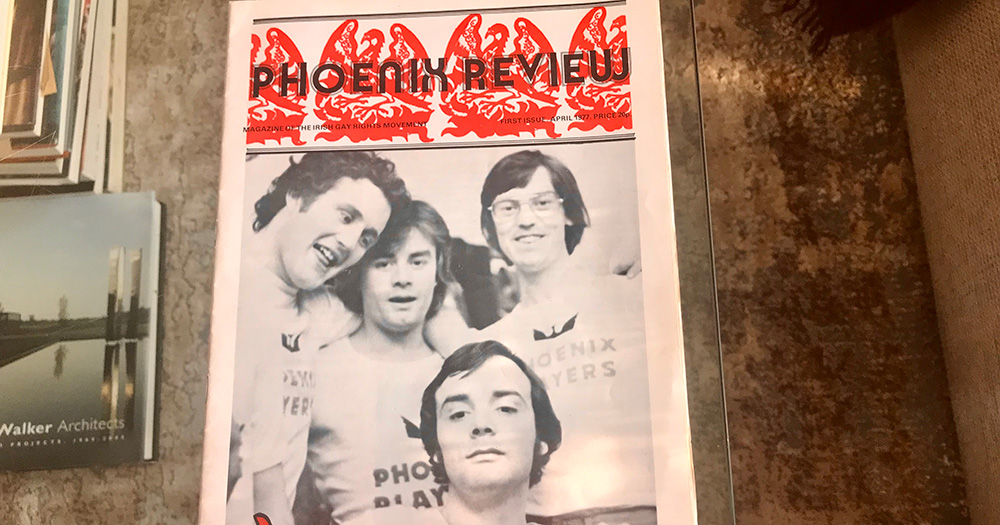When I looked at Seán Connolly, David Norris, the late Clem Clancy and many others at the Irish Gay Rights Movement (IGRM) 50th anniversary event at Printworks in the Morrison Hotel on July 3 last year, I wondered what their memories were of 46 Parnell Square West, home to the IGRM and Phoenix Disco from 1975.
Memories after 50 years are not to be trusted; they can be very unreliable, confusing, but sometimes frighteningly and amazingly accurate. Everyone of my generation (b. 1948) claims to remember exactly, and I mean exactly, what they were doing, eating, drinking, reading, watching, listening to and feeling on the evening of November 22, 1963, Irish time, when President John F. Kennedy was assassinated (I was doing my homework and trying with difficulty not to think of the unattainable Ricky Riordan, he with the gorgeous neck, who sat in front of me in class at Synge Street if you must know).
Anyway, I am blessed with an excellent memory (so far) and my memories of IGRM are, on the whole, good. I think I have blocked out some of the unfortunate episodes, such as the ‘Split’ in 1977, and a few horrible meetings when unpleasant words were uttered. However, in my experience, if there are more than 10 committed queer activists around a meeting room table, it’s a statistical certainty that one will storm out in tears or another will storm into the room in a rage.
My involvement with IGRM was very minor and lasted for less than two years from 1975 to 1977. There were discos every weekend in the basement and I either helped in the cloakroom or sold copies of Phoenix Review for 20 old pence a copy. The discos became very popular and had a strict no alcohol, no drugs policy. There was also a black list with names of previous patrons who had been aggressive, violent, or looking for business.
The discos were frequently visited by the police who searched the place for evidence of drink, drugs and maybe the presence of a member of the force. The IGRM volunteers became used to these ‘visits’, i.e. raids. We usually stopped the music, turned up the lights and waited calmly until the cops left the building. Some of us, and I’m not ashamed to say it, stared provocatively at the attractive ones, and they were in short supply, I can assure you. The ‘visits’ were clearly An Garda Síochána’s way of blatantly intimidating the queers. They, and their masters in Iveagh House, Leister House and the Archdiocese, were telling us who was in charge.
The stigma attached to the ‘love that dare not speak its name’ was very apparent to many of us then and still exists today, I believe, cleverly hidden in some quarters. The arrival of AIDS in 1981 reinforced that stigma. It was hard, very hard, to come out in those days. You risked losing your family, friends, social standing and job (as I did, not once, but twice).
When the cops departed empty-handed, the disco recommenced with everyone on the dance floor rocking away to Thelma Houston singing ‘Don’t Leave Me This Way’.
I was a founder editor of the magazine of the Irish Gay Rights Movement, the Phoenix Review, and it was so wildly successful that there never came a second issue. When I look at my 1977 diary, I’m astonished at the amount of time I spent with John Byrne and Tom Kelly, the other two editors, putting together the one and only copy. There were endless meetings, sometimes in Conway’s Pub, in the evenings and at weekends. I lived in Sandycove then and cycled into town for the meetings and the discos.
Eventually in April 1977, we produced the magazine. There was an interview with Gay Sweatshop, appearing at the Project Arts Theatre, an article ‘Me And The Gay Within’ by Elgy Gillespie of The Irish Times, and one by David Norris entitled ‘Poor Old Law. The Theoretical Case Against Maintenance Of The Present Legal Situation’. There was also poetry and photos from the IGRM pantomime and a few cartoons.
It was fun while it lasted, and we gave it our all.
Some people’s names have been changed to protect the innocent (and the not-so-innocent), and the dearly departed.
© 2025 GCN (Gay Community News). All rights reserved.
Support GCN
GCN is a free, vital resource for Ireland’s LGBTQ+ community since 1988.
GCN is a trading name of National LGBT Federation CLG, a registered charity - Charity Number: 20034580.
GCN relies on the generous support of the community and allies to sustain the crucial work that we do. Producing GCN is costly, and, in an industry which has been hugely impacted by rising costs, we need your support to help sustain and grow this vital resource.
Supporting GCN for as little as €1.99 per month will help us continue our work as Ireland’s free, independent LGBTQ+ media.
